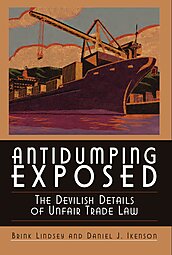The U.S. antidumping law enjoys broad political support in part because so few people understand how the law actually works. Its rhetoric of “fairness” and “level playing fields” sounds appealing, and its convoluted technical complexities prevent all but a few insiders and experts from understanding the reality that underlies that rhetoric.
CONNUM? CEP? FUPDOL? TOTPUDD? DIFMER? NPRICOP? POI? POR? LOT? Confused? You’re not alone. Even members of Congress, whose opinions shape the course of U.S. trade policy, are baffled by those devilish details.
This book seeks to penetrate the fog of complexity that shields the antidumping law from the scrutiny it deserves. It offers a detailed, step-by-step guide to how dumping is defined and measured under current rules. It identifies the many methodological quirks and biases that allow normal, healthy competition to be stigmatized as “unfair” and punished with often cripplingly high antidumping duties. The inescapable conclusion is that the antidumping law, as it currently stands, has nothing to do with maintaining a “level playing field.” Instead, antidumping’s primary function is to provide an elaborate excuse for old-fashioned protectionism.
What goes around comes around. As traditional tariff barriers have been gradually lowered throughout the world, antidumping has emerged to fill the void. India, China, South Africa, Brazil, and dozens of other countries have adopted and implemented their own antidumping laws. In recent years, U.S. exports have been targeted with increasing frequency.
It was this trend that the Bush administration cited as justification for agreeing to antidumping negotiations in the Doha Round of global trade talks. Powerful political forces, however, seek to prevent U.S. acceptance of any meaningful reform. Steel producers and other import-competing industries have long dominated the formulation of U.S. antidumping policy. Their lobbying has made the U.S. law increasingly protectionist and caused U.S. trade negotiators to block improved international rules.
Continued U.S. opposition to reform would carry high costs. Without substantive changes to antidumping rules, the Doha Round is likely to fail.
Accordingly, the authors offer 20 specific proposals for reform of the World Trade Organization’s Antidumping Agreement. Their analysis and ideas should be of great interest to businesses, trade lawyers, and trade negotiators around the world.
